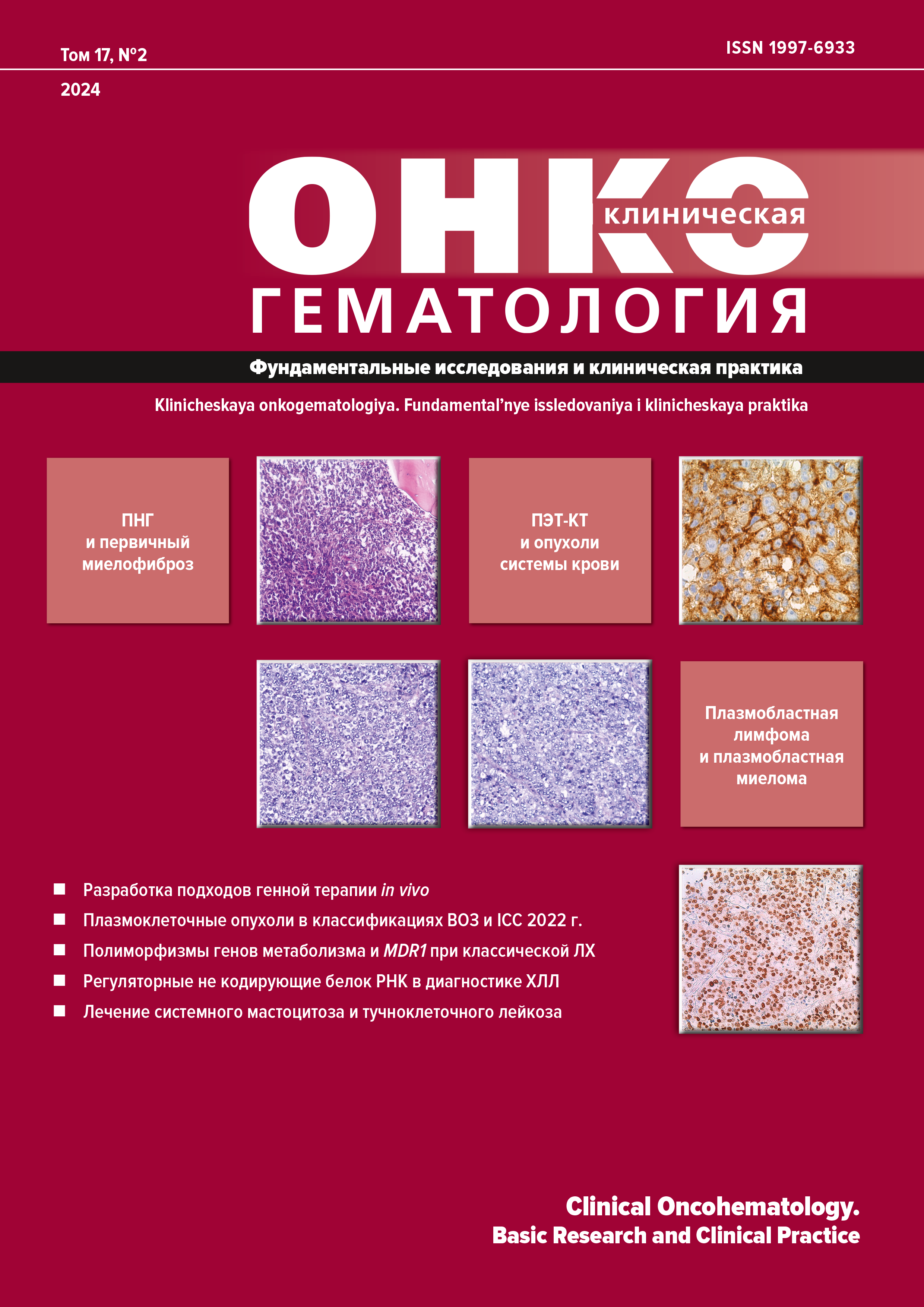Abstract
Aim. To study risk factors for relapses of perianal infection (PI) in patients with hematological tumors.
Materials & Methods. This single-center prospective clinical trial (2016–2020) enrolled all oncohematological patients at the National Research Center for Hematology who developed PI at various stages of chemotherapy. To assess the impact of some factors on relapsing perianal infectious complications, the distribution of clinical characteristics in groups of patients with single or multiple PI episodes was analyzed.
Results. The trial addressed 158 PI episodes in 132 patients; there were 64 men and 68 women, the median age was 40 years (range 18–77 years). PI relapses were identified in 22 (16.67 %) patients, with a higher incidence in acute myeloid leukemia (AML) patients (63.64 %). Recurrent PI episodes were usually registered on program therapy of acute leukemias (73.08 %), more often at consolidation stage (38.46 %) than at other stages of treatment (17.42 %) (hazard ratio [HR] 2.96; 95% confidence interval [95% CI] 1.19–7.35; p < 0.031). With the follow-up of 360 days from the first episode, the probability of PI relapses was 16.2 %, and it was higher in AML patients (24.3 %). In non-remission AML patients having the first PI episode, the probability of PI relapses considerably increased and accounted for 52.6 %. In case of cryptogenic pararectal abscesses, it was 20 %, if solely abscess drainage was performed at the first stage. However, no relapses were registered after the surgical treatment of pararectal fistulas. The risk factors for recurrent PI, as was shown by univariate analysis, were AML diagnosis (HR 2.94; 95% CI 1.14–7.62; p < 0.032) and the lack of remission of hematological tumor by the time of the first PI episode (HR 2.98; 95% CI 1.13–7.90; p < 0.034). By multivariate analysis, the significant risk factor was non-remission AML diagnosis by the time of the first PI episode (HR 6.94; 95% CI 2.93–16.66; p < 0.0001).
Conclusion. The significant risk factor for PI relapses is non-remission AML diagnosis by the time of the first infectious episode. This category of patients shows the maximal probability of relapsing perianal infectious complications, which is 52.6 %. To prevent PI relapses in patients with cryptogenic pararectal abscesses, abscess drainage should be combined with scheduled surgery of anal fistulas.
References
- Oliver I, Lacueva FJ, Perez Vicente F, et al. Randomized clinical trial comparing simple drainage of anorectal abscess with and without fistula track treatment. Int J Colorectal Dis. 2003;18(2):107–10. doi: 10.1007/s00384-002-0429-0.
- Solmaz S, Korur A, Gereklioglu C, et al. Anorectal Complications During Neutropenic Period in Patients with Hematologic Diseases. Mediterr J Hematol Infect Dis. 2016;8(1):e2016019. doi: 10.4084/MJHID.2016.019.
- Chang H, Kuo M-C, Tang T-C, et al. Clinical Features and Recurrence Pattern of Perianal Abscess in Patients with Acute Myeloid Leukemia. Acta Haematologica. 2017;138(1):10–3. doi: 10.1159/000475589.
- Chen CY, Cheng A, Huang SY, et al. Clinical and microbiological characteristics of perianal infections in adult patients with acute leukemia. PLoS One. 2013;8(4):e60624. doi: 10.1371/journal.pone.0060624.
- Lehrnbecher T, Marshall D, Gao C, Chanock SJ. A Second Look at Anorectal Infections in Cancer Patients in a Large Cancer Institute: The Success of Early Intervention with Antibiotics and Surgery. Infection. 2002;30(5):272–6. doi: 10.1007/s15010-002-2197-8.
- Badgwell BD, Chang GJ, Rodriguez-Bigas MA, et al. Management and outcomes of anorectal infection in the cancer patient. Ann Surg Oncol. 2009;16(10):2752–8. doi: 10.1245/s10434-009-0626-y.
- Morcos B, Amarin R, Abu Sba A, et al. Contemporary management of perianal conditions in febrile neutropenic patients. Eur J Surg Oncol. 2013;39(4):404–7. doi: 10.1016/j.ejso.2013.01.001.
- Loureiro RV, Borges VP, Tome AL, et al. Anorectal complications in patients with haematological malignancies. Eur J Gastroenterol Hepatol. 2018;30(7):722–6. doi: 10.1097/MEG.0000000000001133.
- Sullivan PS, Moreno C. A Multidisciplinary Approach to Perianal and Intra-Abdominal Infections in the Neutropenic Cancer Patient. Oncology (Williston Park). 2015;29(8):581–90.
- Штыркова С.В., Клясова Г.А., Карагюлян С.Р. и др. Особенности перианальных инфекционных осложнений у больных гранулоцитопенией и опухолевыми заболеваниями системы крови. Колопроктология. 2020;19(4):10–31. doi: 10.33878/2073-7556-2020-19-4-10-31. [Shtyrkova SV, Klyasova GA, Karagyulyan SR, et al. Perianal infectious complications in patients with granulocytopenia and haematological malignancies. Koloproktologia. 2020;19(4):10–31. doi: 10.33878/2073-7556-2020-19-4-10-31. (In Russ)]
- Jiang Q, Zhang D, Majaw J, et al. Minimization of the perianal infection rate of hematological malignancies with agranulocytosis by quality control circle activity and patient-hospital-student win-win concept. J Int Med Res. 2018;46(6):2338–45. doi: 10.1177/0300060517726863.

This work is licensed under a Creative Commons Attribution-NonCommercial-ShareAlike 4.0 International License.
Copyright (c) 2024 Clinical Oncohematology
